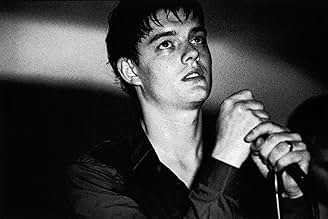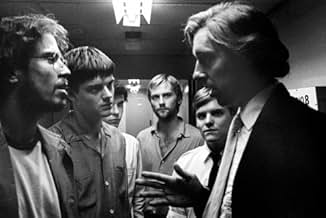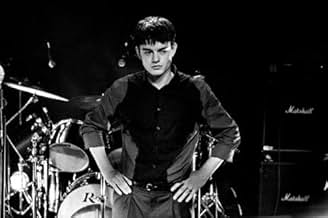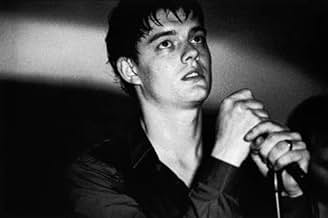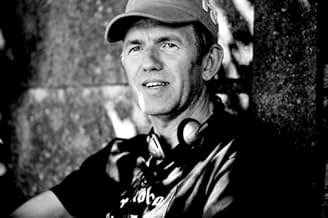Control
- 2007
- Tous publics
- 2h 2min
NOTE IMDb
7,6/10
71 k
MA NOTE
Un portrait de Ian Curtis, le chanteur énigmatique de Joy Division, que les ennuis personnels, professionnels et romantiques ont conduit à se suicider à l'âge de 23 ans.Un portrait de Ian Curtis, le chanteur énigmatique de Joy Division, que les ennuis personnels, professionnels et romantiques ont conduit à se suicider à l'âge de 23 ans.Un portrait de Ian Curtis, le chanteur énigmatique de Joy Division, que les ennuis personnels, professionnels et romantiques ont conduit à se suicider à l'âge de 23 ans.
- Réalisation
- Scénario
- Casting principal
- Victoire aux 1 BAFTA Award
- 31 victoires et 36 nominations au total
Martha Myers Lowe
- Ian's Sister
- (as Martha Myers-Lowe)
Mary Jo Randle
- Debbie's Mother
- (as Mary-Jo Randle)
Avis à la une
The first thing that strikes you about 'Control' is its silence, and the chilly beauty of its black and white images. As a still photographer first-time director Anton Corbijn photographed Joy Division in black and white during their short existence. He knows how to get the remorselessly grim feel of the north of England in the late Seventies. (The boys came from the outskirts of Manchester. Joy Division formed in 1976.) This film (there's a documentary just coming out on the band too) is loosely based on a memoir of her marriage by Deborah Curtis, lead singer Ian Curtis' young wife, who had a baby girl by him and then tragically found him after he'd hanged himself in 1980, two months short of his twenty-fourth birthday, just as the band was to tour America for the first time.
'Control's' strength is a certain recessiveness. In the English style, it's offhand and avoids huge dramatic crescendos. That's refreshing. And besides the images and the restraint, the film is worth seeing for the concert sequences. The cast actually plays the Joy Division music live, and Sam Riley, who plays Ian Curtis, not only closely resembles him, but is a riveting and intense, almost at times scary, performer. When he says the public doesn't know how much of himself he puts into his performances, we know what he means.
The film is excellent at showing Ian's dilemmas. The band is a sudden success. He has an attack in their car as the band returns from a gig. Doctors tell him he has a form of epilepsy. He's given a fistful of pills to take every day and told to have early nights and stay off the booze. How faithfully he takes the pills is unclear but he suffers from their side effects in various ways, while late nights and booze are essentials of his existence. It doesn't seem that the English doctors knew very well how to treat him, and he was so busy performing he didn't take the time to go to specialists and have more extensive tests.
Ian had gotten married to Deborah (Samantha Morton) early--too early. On the road he meets a Belgian part-time journalist, Annik Honoré (Alexandra Maria Lara), and they fall uneasily in love. He's not strong enough to decide between the two women. Fear that his disease will only get worse hounds him, and the fits go on. Riley is fascinating to watch as he undergoes an increasingly visible meltdown. Other cast members are cyphers, though Joe Anderson, who has the role of Max in Taymor's Across the Universe, is the lead guitarist. Morton has a drab role but Deborah's unfortunate situation is present as a constant counterpart to Ian's story. The two other important characters are the Manchester music guru Tony Wilson (Craig Parkinson) and the band's wise-guy manager Rob Gretton (Toby Kebbell).
The creative inspiration of the band, the nature of their songs, the cast of their lyrics, the reason why Joy Division is a cult band today when it only existed for four years--these are matters the film is unable to elucidate. Watch it for the cool visuals, for the tall, soulful Sam Riley, and for the terrific live performance scenes. Enjoy the understatement, and the silence. Don't expect more.
Harvey Weinstein has chosen both for Control and for the soon-to-open Todd Haynes Bob Dylan film I'm Not There to have a slowly-unrolling distribution system, and hopes to bestow early cult status on both films by having them premiere at that temple of cinephilia, Film Forum, in lower Manhattan, New York City, and wait for the buzz of the cognoscenti to multiply and spread. It may work. But both films are tough sells. But A.E. Scott of the NYTimes has said Control is "enigmatic and moving, much in the manner of Joy Division's best songs." And that's a good send-off.
'Control's' strength is a certain recessiveness. In the English style, it's offhand and avoids huge dramatic crescendos. That's refreshing. And besides the images and the restraint, the film is worth seeing for the concert sequences. The cast actually plays the Joy Division music live, and Sam Riley, who plays Ian Curtis, not only closely resembles him, but is a riveting and intense, almost at times scary, performer. When he says the public doesn't know how much of himself he puts into his performances, we know what he means.
The film is excellent at showing Ian's dilemmas. The band is a sudden success. He has an attack in their car as the band returns from a gig. Doctors tell him he has a form of epilepsy. He's given a fistful of pills to take every day and told to have early nights and stay off the booze. How faithfully he takes the pills is unclear but he suffers from their side effects in various ways, while late nights and booze are essentials of his existence. It doesn't seem that the English doctors knew very well how to treat him, and he was so busy performing he didn't take the time to go to specialists and have more extensive tests.
Ian had gotten married to Deborah (Samantha Morton) early--too early. On the road he meets a Belgian part-time journalist, Annik Honoré (Alexandra Maria Lara), and they fall uneasily in love. He's not strong enough to decide between the two women. Fear that his disease will only get worse hounds him, and the fits go on. Riley is fascinating to watch as he undergoes an increasingly visible meltdown. Other cast members are cyphers, though Joe Anderson, who has the role of Max in Taymor's Across the Universe, is the lead guitarist. Morton has a drab role but Deborah's unfortunate situation is present as a constant counterpart to Ian's story. The two other important characters are the Manchester music guru Tony Wilson (Craig Parkinson) and the band's wise-guy manager Rob Gretton (Toby Kebbell).
The creative inspiration of the band, the nature of their songs, the cast of their lyrics, the reason why Joy Division is a cult band today when it only existed for four years--these are matters the film is unable to elucidate. Watch it for the cool visuals, for the tall, soulful Sam Riley, and for the terrific live performance scenes. Enjoy the understatement, and the silence. Don't expect more.
Harvey Weinstein has chosen both for Control and for the soon-to-open Todd Haynes Bob Dylan film I'm Not There to have a slowly-unrolling distribution system, and hopes to bestow early cult status on both films by having them premiere at that temple of cinephilia, Film Forum, in lower Manhattan, New York City, and wait for the buzz of the cognoscenti to multiply and spread. It may work. But both films are tough sells. But A.E. Scott of the NYTimes has said Control is "enigmatic and moving, much in the manner of Joy Division's best songs." And that's a good send-off.
Control, a biopic about a band from Manchester, is getting serious attention from around the world. Starting with an award in Cannes. That's maybe more than you might expect. Joy Division, a respected band of the 70s, are hardly a name on everyone's lips. And films made by ex music video directors about yet another load of rockers rarely raise eyebrows. So why is this different? Joy Division, for non-initiates, were a post-punk Manchester band of throbbing guitars and dark, doom-laden lyrics. Recognition in the music biz (especially by other musicians) was perhaps even greater after the death of lead singer, Ian Curtis. Control covers a period from his schooldays to his end in 1980 (aged 23). It is based on the biography of his widow.
Control uses Curtis' love of poetry, as well as the more familiar songs-that-tell-a-story device, to provide at least scant insight into the music. "I wish I were a Warhol silkscreen, hanging on the wall," he muses. But what is dealt with in much more detail is his growing sense of isolation, coping with epilepsy as the pressures of touring build up, and the distraught domestic relations he is embroiled in with wife Debbie (Samantha Morton) and romantic-interest-from-afar Annik (Alexandra Maria Lara). "It's like it's not happening to me but someone pretending to be me. Someone dressed in my skin," he says.
In a telling scene when he is under hypnosis, the camera revolves around his head as we hear voices speaking to him. "Ian, let me in, love," says his wife, "there's room to talk." Responsibilities as husband and father. A mistress who is also in love with him. A band and fan following who want more than he can give. From warholian, carefree screen-dream of youth, he has arrived at a place where he doesn't want to be. Drugs and their side-effects no longer a schoolboy's recreational laugh. Prescription bottles grip with morbid fascination. And the knowledge that doctors don't have a cure.
The film carries viewers away with blistering intensity. Relative newcomer Sam Riley plays Curtis with alarming energy. With Samantha Morton, it's not what she says but what you see going through her mind. She contains her expressiveness for the camera to pick up (rather than thrusting it on us). We want to cry inside for her character. As a feat of interiorisation, Control puts her as a contender in the shoes of Meryl Streep.
Supporting cast members come through with believability and sincerity, sparkling with well-honed contrasts. Toby Kebbell, fast-talking manager Rob, lifts us out of the depressive mood with wisecracks enough to make legless monkeys jump. "Where's my £20?" asks a hapless stand-in as Rob deals with an emergency. "In my f*ck-off pocket!" he barks back. Craig Parkinson is record producer and late TV presenter Tony Wilson (to whom the opening screening at the Edinburgh International Film Festival was dedicated). He demonstrates fine shades of teeth-gritting tolerance, explaining to the band, seconds before their first live TV show: yes, 'large dog's c*ck' counts as swearing, and would mean the broadcast is pulled. Established Romanian actress, Alexandra Maria Lara, succeeds in making Annik far more than the two-dimensional bit-of-fluff that would have been an easy course. As potential home-breaker, it is tempting to hate her, yet her character is shown with the intellectual appreciation and chemistry that Debbie can no longer offer.
Morton, in the Q&A after the Edinburgh premiere, links the film to Saturday Night and Sunday Morning. It is the kitchen-sink, downtrodden existence that her Debbie inhabits. Cinematography is also reminiscent of this period, with its careful black-and-white observation of working class streets. I watched it a second time, enjoying careful compositions and suggestive mise-en-scene. But director Anton Corbijn is typically modest. "I really wanted you to look at the actors on the screen and only afterwards at the look of the film." While Ian, in Debbie's eyes, might be the licentious and 'angry young man' of social realism drama, the Control scenes from which she is tormentedly absent show another side: the world experienced by her husband (a reference in the film likens his isolation to Brando's character in Apocalypse Now).
"And we would go on as though nothing was wrong. And hide from these days we remained all alone."
Riley takes on manic expressions as if marching away from an impending epileptic fit while singing Transmission. It is such a potent, almost frightening feat, that we have to shake ourselves to remember he only got the part when he was stuck for a job. "Not a lot was going on in my life before this, so I was appreciative for the work and the money," he tells the opening night audience. "I imagine this will have opened doors for you," I had said to him earlier; he smiled like a man who still can't believe his good luck. But the 'luck' is very well deserved. His 'Ian' is physically and mentally complex. When I had managed to stop him on the Red Carpet long enough to congratulate him, Mr Riley explains that he had a friend who was an epileptic. "I witnessed an attack often enough to be able to copy it."
Although the film has a driving energy that takes our breath away, it drifts a little towards the tragic conclusion. We know the ending and it is a case of waiting for it to happen. And although it features plenty of excellent Joy Division tracks, any music biopic will never be good enough or accurate enough for some fans.
Fortunately this is not just for music fans but for serious film fans as well. It careers in a tightly controlled arc, where music biopic meets cinematic excellence. Why should you see it? "Some people visit the past for sentimental reasons," says Corbijn. "Some people visit the past to understand the present better." Control is not in the sentimental exercise category.
Control uses Curtis' love of poetry, as well as the more familiar songs-that-tell-a-story device, to provide at least scant insight into the music. "I wish I were a Warhol silkscreen, hanging on the wall," he muses. But what is dealt with in much more detail is his growing sense of isolation, coping with epilepsy as the pressures of touring build up, and the distraught domestic relations he is embroiled in with wife Debbie (Samantha Morton) and romantic-interest-from-afar Annik (Alexandra Maria Lara). "It's like it's not happening to me but someone pretending to be me. Someone dressed in my skin," he says.
In a telling scene when he is under hypnosis, the camera revolves around his head as we hear voices speaking to him. "Ian, let me in, love," says his wife, "there's room to talk." Responsibilities as husband and father. A mistress who is also in love with him. A band and fan following who want more than he can give. From warholian, carefree screen-dream of youth, he has arrived at a place where he doesn't want to be. Drugs and their side-effects no longer a schoolboy's recreational laugh. Prescription bottles grip with morbid fascination. And the knowledge that doctors don't have a cure.
The film carries viewers away with blistering intensity. Relative newcomer Sam Riley plays Curtis with alarming energy. With Samantha Morton, it's not what she says but what you see going through her mind. She contains her expressiveness for the camera to pick up (rather than thrusting it on us). We want to cry inside for her character. As a feat of interiorisation, Control puts her as a contender in the shoes of Meryl Streep.
Supporting cast members come through with believability and sincerity, sparkling with well-honed contrasts. Toby Kebbell, fast-talking manager Rob, lifts us out of the depressive mood with wisecracks enough to make legless monkeys jump. "Where's my £20?" asks a hapless stand-in as Rob deals with an emergency. "In my f*ck-off pocket!" he barks back. Craig Parkinson is record producer and late TV presenter Tony Wilson (to whom the opening screening at the Edinburgh International Film Festival was dedicated). He demonstrates fine shades of teeth-gritting tolerance, explaining to the band, seconds before their first live TV show: yes, 'large dog's c*ck' counts as swearing, and would mean the broadcast is pulled. Established Romanian actress, Alexandra Maria Lara, succeeds in making Annik far more than the two-dimensional bit-of-fluff that would have been an easy course. As potential home-breaker, it is tempting to hate her, yet her character is shown with the intellectual appreciation and chemistry that Debbie can no longer offer.
Morton, in the Q&A after the Edinburgh premiere, links the film to Saturday Night and Sunday Morning. It is the kitchen-sink, downtrodden existence that her Debbie inhabits. Cinematography is also reminiscent of this period, with its careful black-and-white observation of working class streets. I watched it a second time, enjoying careful compositions and suggestive mise-en-scene. But director Anton Corbijn is typically modest. "I really wanted you to look at the actors on the screen and only afterwards at the look of the film." While Ian, in Debbie's eyes, might be the licentious and 'angry young man' of social realism drama, the Control scenes from which she is tormentedly absent show another side: the world experienced by her husband (a reference in the film likens his isolation to Brando's character in Apocalypse Now).
"And we would go on as though nothing was wrong. And hide from these days we remained all alone."
Riley takes on manic expressions as if marching away from an impending epileptic fit while singing Transmission. It is such a potent, almost frightening feat, that we have to shake ourselves to remember he only got the part when he was stuck for a job. "Not a lot was going on in my life before this, so I was appreciative for the work and the money," he tells the opening night audience. "I imagine this will have opened doors for you," I had said to him earlier; he smiled like a man who still can't believe his good luck. But the 'luck' is very well deserved. His 'Ian' is physically and mentally complex. When I had managed to stop him on the Red Carpet long enough to congratulate him, Mr Riley explains that he had a friend who was an epileptic. "I witnessed an attack often enough to be able to copy it."
Although the film has a driving energy that takes our breath away, it drifts a little towards the tragic conclusion. We know the ending and it is a case of waiting for it to happen. And although it features plenty of excellent Joy Division tracks, any music biopic will never be good enough or accurate enough for some fans.
Fortunately this is not just for music fans but for serious film fans as well. It careers in a tightly controlled arc, where music biopic meets cinematic excellence. Why should you see it? "Some people visit the past for sentimental reasons," says Corbijn. "Some people visit the past to understand the present better." Control is not in the sentimental exercise category.
For me personally writing a comment for Control has proved to be a very difficult thing, my love of the band Joy Division has stayed with me from the very first moment I listened to the Unknown Pleasures album back in 1979. I remember Ian Curtis's death like it was yesterday, and no matter how many years roll by, I still feel an immense sadness when listening to the bands poetic beauty. I was mightily relieved after reading Deborah Curtis's book Touching From A Distance, for I found it refreshingly honest, and certainly it helped people get in a bit deeper to just what a troubled young man Ian Curtis was. So here we are in 2008 and the film adaptation of that book has arrived with truly brilliant results.
I have found it hard to write a comment for it because I have to cast aside my biased love of the band, but hopefully I've managed to view it objectively with both my head and my heart. Control is a film about Ian Curtis, the lead singer of the band Joy Division, people expecting an in-depth film about the band will be a little disappointed because this is the story of their lead singer, a troubled young man who just couldn't face it anymore. Filmed in black & white to perfectly capture the essence of the man the film is about, director Anton Corbijn has stayed loyal to the source material and crafted a haunting piece of work that lingers long after the final credits roll.
We follow Ian Curtis from his humble music leanings in the early 70s, here he meets Deborah who is soon to become his wife, a married man at the age of 18. We watch him join a group of Manchester lads at a Sex Pistols concert, it is here that the roots of Joy Division are formed. Then it's on to the formation of Factory records and the influential Svengali Tony Wilson. As the band start to make waves Ian Curtis becomes ill with epilepsy, and it's here that Corbijn crucially shows that the doctors involved really didn't have a clue how to treat him properly, trial and error with cocktails of drugs indeed.
Deborah and Ian become parents to Natalie, but Ian is away on the road for many days and nights, and it's here that he yearns for love from another quarter, and it's here that his infidelity will hang heavy on his already sunken shoulders. The band are set to make it big, their manager announces that they are about to tour America for the first time, this only adds another fraught string to Ian's already fractured bow, the pressure of fame a lethal bedfellow with Messrs epilepsy and infidelity, and then? I can't praise the work on this film enough, Sam Riley {relatively unknown outside of his hometown of Leeds} is simply brilliant as Curtis, dragging the viewer in completely on this desperately sad journey. Samantha Morton as Deborah is immense, she nails the emotional see-saw role with professional aplomb, and I would also like to raise a glass for the performance of the criminally undervalued Toby Kebbell (Dead Man's Shoes, Wilderness) his turn as Joy Division's manager Rob Gretton is down pat. Director Corbijn clearly had love for the project, and thankfully he was sensible enough to not over do the sentimental aspect of the troubled star. What Corbijn has done is perfectly frame the bleaker side of the story with old terraced houses and monstrous looking high rise's, they scream out as dank and dreary statements in black & white, yet they are overlooked by rolling hills to serve as a reminder when Curtis was at his happiest during the courtship with Deborah. Some scenes are unforgettable, such is the power of the emotion on offer, look out for the stunning appearance of heart tugging song Love Will Tear Us Apart, a crucial and poignant scene, and of course the film's tragic outcome hits like a sledgehammer. To which I thank Corbijn for giving us a very tasteful conclusion to this sad sad story.
So there it is, was I biased? I like to think I wasn't because I honestly feel that one doesn't have to be a fan of the band to get much from this movie. The film has won many awards, and I'm happy to report that Control has brought renewed interest in the beautiful/haunting work of one of England's greatest ever bands. Remastered CDs, reissued books, and even T-shirts are selling well in the shops as I type.
Control is a very sobering experience for fans and newcomers alike. 10/10
RIP Ian Curtis, you are very much missed.
I have found it hard to write a comment for it because I have to cast aside my biased love of the band, but hopefully I've managed to view it objectively with both my head and my heart. Control is a film about Ian Curtis, the lead singer of the band Joy Division, people expecting an in-depth film about the band will be a little disappointed because this is the story of their lead singer, a troubled young man who just couldn't face it anymore. Filmed in black & white to perfectly capture the essence of the man the film is about, director Anton Corbijn has stayed loyal to the source material and crafted a haunting piece of work that lingers long after the final credits roll.
We follow Ian Curtis from his humble music leanings in the early 70s, here he meets Deborah who is soon to become his wife, a married man at the age of 18. We watch him join a group of Manchester lads at a Sex Pistols concert, it is here that the roots of Joy Division are formed. Then it's on to the formation of Factory records and the influential Svengali Tony Wilson. As the band start to make waves Ian Curtis becomes ill with epilepsy, and it's here that Corbijn crucially shows that the doctors involved really didn't have a clue how to treat him properly, trial and error with cocktails of drugs indeed.
Deborah and Ian become parents to Natalie, but Ian is away on the road for many days and nights, and it's here that he yearns for love from another quarter, and it's here that his infidelity will hang heavy on his already sunken shoulders. The band are set to make it big, their manager announces that they are about to tour America for the first time, this only adds another fraught string to Ian's already fractured bow, the pressure of fame a lethal bedfellow with Messrs epilepsy and infidelity, and then? I can't praise the work on this film enough, Sam Riley {relatively unknown outside of his hometown of Leeds} is simply brilliant as Curtis, dragging the viewer in completely on this desperately sad journey. Samantha Morton as Deborah is immense, she nails the emotional see-saw role with professional aplomb, and I would also like to raise a glass for the performance of the criminally undervalued Toby Kebbell (Dead Man's Shoes, Wilderness) his turn as Joy Division's manager Rob Gretton is down pat. Director Corbijn clearly had love for the project, and thankfully he was sensible enough to not over do the sentimental aspect of the troubled star. What Corbijn has done is perfectly frame the bleaker side of the story with old terraced houses and monstrous looking high rise's, they scream out as dank and dreary statements in black & white, yet they are overlooked by rolling hills to serve as a reminder when Curtis was at his happiest during the courtship with Deborah. Some scenes are unforgettable, such is the power of the emotion on offer, look out for the stunning appearance of heart tugging song Love Will Tear Us Apart, a crucial and poignant scene, and of course the film's tragic outcome hits like a sledgehammer. To which I thank Corbijn for giving us a very tasteful conclusion to this sad sad story.
So there it is, was I biased? I like to think I wasn't because I honestly feel that one doesn't have to be a fan of the band to get much from this movie. The film has won many awards, and I'm happy to report that Control has brought renewed interest in the beautiful/haunting work of one of England's greatest ever bands. Remastered CDs, reissued books, and even T-shirts are selling well in the shops as I type.
Control is a very sobering experience for fans and newcomers alike. 10/10
RIP Ian Curtis, you are very much missed.
Control, the story of Ian Curtis, singer of British alternative band Joy Division. The film is made in black and white, which adds a certain edge to the film. There isn't much drama or fast-paced scenes (until the very end, I guess), and that seems to be what everyone criticizes about the movie. Why do you think the director wanted it black and white? If it had been a sincerely boring film, why release it?
Of course they made up some aspects of Ian's life, but the fact is that Ian was a dull, depressed human being. He couldn't handle love, or fame overall. He doesn't show signs of emotion in the film, and doesn't speak much at all. Truth is, black and white was exactly what he saw, while he was spiraling towards the end of his life.
The acting is incredible. Absolutely spot on. Very very noteworthy.
I enjoyed Control, but that's only because I love indie films and rock and roll movies. If you're looking into this movie expecting some delicious drama and edge-of-your-seat thrills, just don't watch it. It's about a man who gradually fell apart, who gradually lost control. And if you can't see that in the film, it's definitely not worth watching.
Of course they made up some aspects of Ian's life, but the fact is that Ian was a dull, depressed human being. He couldn't handle love, or fame overall. He doesn't show signs of emotion in the film, and doesn't speak much at all. Truth is, black and white was exactly what he saw, while he was spiraling towards the end of his life.
The acting is incredible. Absolutely spot on. Very very noteworthy.
I enjoyed Control, but that's only because I love indie films and rock and roll movies. If you're looking into this movie expecting some delicious drama and edge-of-your-seat thrills, just don't watch it. It's about a man who gradually fell apart, who gradually lost control. And if you can't see that in the film, it's definitely not worth watching.
For every icon, there is an unknown predecessor who paves the way. Before there was Kurt Cobain, there was Ian Curtis, lead singer of the post-punk band, Joy Division. 27 years after his tragic death, Curtis' incredible contribution to music is finally being recognized in Anton Corbijn's film, "Control." It's only fitting that Corbijn serve as director since it was his early photographs of Joy Division that reflected the band's dark, introspective songs. Corbijn went on to photograph and direct videos for such musical greats as U2, David Bowie, Depeche Mode, R.E.M. and Metallica.
With his first feature film, Corbijn avoids the pitfalls of many music video directors who inundate us with flashy and unnecessary edits and camera angles. Instead, he lets the stark black and white of the film tell the story of a lead singer tortured by epilepsy, guilt, depression and suicidal thoughts. The use of black and white also captures the factory town of Manchester, England in the late 1970s, a city crumbling under industrial and economic stress. Manchester has since rebounded and is once again thriving.
Curtis is played by relative newcomer, Sam Riley, who's quiet and unassuming approach portrays an artist inspired by his heroes, David Bowie and Iggy Pop. At a chance meeting following a Sex Pistols concert, Curtis bonds with three fellow musicians to form the band.
As Joy Division begins to flourish, Ian's relationship with his young wife, Deborah, continues to distance itself. Academy Award nominee, Samantha Morton plays the confused wife trying to understand her husband's depressed soul. The film is based on Deborah Curtis' autobiography, "Touching From A Distance", so it comes as a surprise that Morton's character does not have more scenes in the movie.
The key to Control is understanding Curtis' depression, which the film accomplishes to near perfection. As he battles epilepsy, the young singer lives in constant fear that his next seizure will be his last. His only option is to swallow a daily cocktail of prescription drugs with side effects so terrible, that most of us would rather tempt fate than endure the aftermath of the pills.
Ian's spirit is also tortured by overwhelming guilt brought on by an extra-marital affair with a part-time journalist, played by Romanian-born Alexandra Maria Lara.
The most telling scene comes when Ian records an in-studio track for the song "Isolation." While Curtis stoically sings into the microphone, his band mates are distracted with the normal banter that typically occurs in a studio.
"Mother, I tried, please believe me. I'm doing the best that I can. I'm ashamed of the things I've been put through. I'm ashamed of the person I am." The lyrics seem to fall on deaf ears except for those of the sound engineer who refers to it as "genius." But Ian's brilliance is also a desperate cry for help ignored by everyone in the studio.
The 27-year-old Riley does an excellent job of capturing Curtis' aloofness on stage. Singers such as Jim Morrison, Kurt Cobain and even the early years of Michael Stipe would often drift into the moment of the song. But when Curtis performed, he immersed himself into his own world where the music simply served as the soundtrack. Riley skillfully draws us into Ian's dark world with a range of subtle head movements and facial expressions to a whirling explosion of arm gyrations that came to personify the singer's stage performances.
Overwhelmed with grief, shame and depression, Ian finally succumbs to his demons at the young age of 23. He left behind a wife, a child and a musical legacy that is finally receiving its just rewards nearly three decades later.
For those looking for a story solely about Joy Division, Control may not be for you. But for those seeking an intuitive perspective into the anguished spirit of one of the most influential alternative bands in history, you will certainly find it in this depressing but incredibly beautiful film.
With his first feature film, Corbijn avoids the pitfalls of many music video directors who inundate us with flashy and unnecessary edits and camera angles. Instead, he lets the stark black and white of the film tell the story of a lead singer tortured by epilepsy, guilt, depression and suicidal thoughts. The use of black and white also captures the factory town of Manchester, England in the late 1970s, a city crumbling under industrial and economic stress. Manchester has since rebounded and is once again thriving.
Curtis is played by relative newcomer, Sam Riley, who's quiet and unassuming approach portrays an artist inspired by his heroes, David Bowie and Iggy Pop. At a chance meeting following a Sex Pistols concert, Curtis bonds with three fellow musicians to form the band.
As Joy Division begins to flourish, Ian's relationship with his young wife, Deborah, continues to distance itself. Academy Award nominee, Samantha Morton plays the confused wife trying to understand her husband's depressed soul. The film is based on Deborah Curtis' autobiography, "Touching From A Distance", so it comes as a surprise that Morton's character does not have more scenes in the movie.
The key to Control is understanding Curtis' depression, which the film accomplishes to near perfection. As he battles epilepsy, the young singer lives in constant fear that his next seizure will be his last. His only option is to swallow a daily cocktail of prescription drugs with side effects so terrible, that most of us would rather tempt fate than endure the aftermath of the pills.
Ian's spirit is also tortured by overwhelming guilt brought on by an extra-marital affair with a part-time journalist, played by Romanian-born Alexandra Maria Lara.
The most telling scene comes when Ian records an in-studio track for the song "Isolation." While Curtis stoically sings into the microphone, his band mates are distracted with the normal banter that typically occurs in a studio.
"Mother, I tried, please believe me. I'm doing the best that I can. I'm ashamed of the things I've been put through. I'm ashamed of the person I am." The lyrics seem to fall on deaf ears except for those of the sound engineer who refers to it as "genius." But Ian's brilliance is also a desperate cry for help ignored by everyone in the studio.
The 27-year-old Riley does an excellent job of capturing Curtis' aloofness on stage. Singers such as Jim Morrison, Kurt Cobain and even the early years of Michael Stipe would often drift into the moment of the song. But when Curtis performed, he immersed himself into his own world where the music simply served as the soundtrack. Riley skillfully draws us into Ian's dark world with a range of subtle head movements and facial expressions to a whirling explosion of arm gyrations that came to personify the singer's stage performances.
Overwhelmed with grief, shame and depression, Ian finally succumbs to his demons at the young age of 23. He left behind a wife, a child and a musical legacy that is finally receiving its just rewards nearly three decades later.
For those looking for a story solely about Joy Division, Control may not be for you. But for those seeking an intuitive perspective into the anguished spirit of one of the most influential alternative bands in history, you will certainly find it in this depressing but incredibly beautiful film.
Le saviez-vous
- AnecdotesThe actors playing Joy Division learned how to play the songs themselves. So the scenes where the band is playing live is not from tape, but actually the actors playing live.
- GaffesJoy Division is shown performing "Transmission" on Tony Wilson's television show in September 1978, but in reality, they performed "Shadowplay". The performance that is represented in this scene actually took place a year later in September 1979 on the BBC2 program "Something Else", when they performed "Transmission" (a performance which was used as the music video for the song) and "She's Lost Control".
- Citations
Ian Curtis: Existence. Well, what does it matter? I exist on the best terms I can. The past is now part of my future. The present is well out of hand.
- Crédits fousSPOILER: Epilogue: "Ian Curtis died May 18, 1980. He was 23 years old."
- Bandes originalesDrive-In Saturday
(David Bowie)
Published by kind permission of Tintoretto Music/RZO Music Ltd/EMI Music Publishing Ltd/Chrysalis Music Ltd © 1973
Performed by David Bowie
Courtesy of RZO Music
Meilleurs choix
Connectez-vous pour évaluer et suivre la liste de favoris afin de recevoir des recommandations personnalisées
Détails
- Date de sortie
- Pays d’origine
- Site officiel
- Langue
- Aussi connu sous le nom de
- Контроль
- Lieux de tournage
- Sociétés de production
- Voir plus de crédits d'entreprise sur IMDbPro
Box-office
- Budget
- 4 500 000 € (estimé)
- Montant brut aux États-Unis et au Canada
- 872 252 $US
- Week-end de sortie aux États-Unis et au Canada
- 27 674 $US
- 14 oct. 2007
- Montant brut mondial
- 8 159 996 $US
- Durée
- 2h 2min(122 min)
- Couleur
- Mixage
- Rapport de forme
- 2.35 : 1
Contribuer à cette page
Suggérer une modification ou ajouter du contenu manquant





